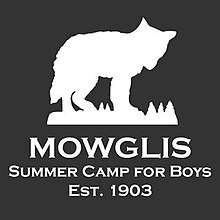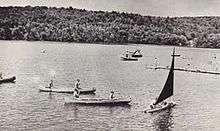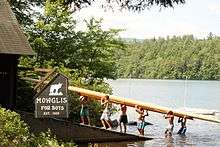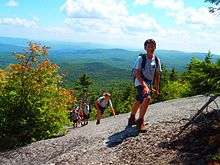Camp Mowglis
| Camp Mowglis | |
|---|---|
 | |
| Location | East Hebron, New Hampshire |
| Coordinates | 43°41′46″N 71°46′15″W / 43.69611°N 71.77083°W |
| Operated by | Holt Elwell Memorial Foundation |
| Established | 1903 |
| Website | mowglis.org |
Camp Mowglis is a nonprofit, residential camp founded in 1903, and one of the oldest summer camps in the United States. It is located in East Hebron, New Hampshire, on the shores of Newfound Lake and owned by the nonprofit Holt Elwell Memorial Foundation.[1] Mowglis was created with encouragement from author Rudyard Kipling and incorporates themes from his Jungle Books.[2]
History

At the turn of the last century, Elizabeth Ford Holt, a reformer from Cambridge, Massachusetts, became interested in establishing summer camps to encourage character development in children. In 1900, she started a short-lived camp for girls, Redcroft, which historian Barksdale Maynard called "the first girls camp of significance."[3] Three years later, Holt purchased the Barnard Farm on the shores of Newfound Lake and founded the Mowglis School of the Open.[4] She contacted Rudyard Kipling while he was living at Naulakha in nearby Dummerston, Vermont, and received his permission to borrow names and themes from the Jungle Books.
Throughout their lives, Rudyard Kipling and his wife Carrie maintained an active interest in Camp Mowglis, which still carries on traditions that Kipling inspired—the camp's historic wooden buildings have names such as Akela, Toomai, Baloo, and Panther. The campers are referred to as "the Pack", from the youngest "Cubs" to the oldest campers living in "Den".[5] Kipling instructed Mrs. Holt on how to pronounce Mowglis ("Mow" sounds like cow, and "glee"). In 1925, after the camp had been operating for two decades, Kipling wrote Mrs. Holt that "more than ever" he admired "the spirit that made so magnificent and helpful a work grow out of such a tiny little seed of a name."[6]

In 2012, Camp Director Sam Punderson retired to spend more time with his family, and the foundation hired Nick Robbins as the new director. A graduate of Colorado College, Mr. Robbins has been a year-round camp director for the last decade, is active with the American Camp Association and is a certified Outdoor Emergency Care Provider with the National Ski Patrol.[7]
Philosophy
Mowglis offers a traditional summer camp experience, stressing character development, personal growth, and community building. It limits admission to about 110 campers each summer and maintains a 4:1 ratio of campers to staff.
Boys wear uniforms and sleep in rustic, open cabins. Electronics are banned at the camp so that boys can avoid the constant stimulation of electronic media and become more aware of their surroundings. They are responsible for making their own beds, maintaining living areas in good condition, and passing regular inspection by counselors.[8]

Programs

A portion of each camper's day is spent in "Industries" (activities) taught in an individualized setting by a staff member selected for his or her qualifications. Boys have their choice of activities and may work toward achieving a ribbon acknowledging their accomplishments and skill level.
In addition to Industries, there is a daily "Open Period" when the camp gathers for team games, counselor hunts, capture the flag, or problem-solving and leadership games.
Swimming, crew, and sailing are important sports at Mowglis. The Pack is divided into Red and Blue teams which compete in a day of crew races at the end of the summer.
One unique aspect of Mowglis is the crew program. Boys learn to row in custom built crew boats that are wider and deeper than traditional crew shells, so they’re stable accommodating boys of all ages and skill levels. The two Mowglis boats each seat six oarsmen with stationary seats. The original crew boats served Mowglis for over 90 years and were replaced by exact replicas in 2002. All the boys get the opportunity to row and gain experience during the summer. At the beginning of week six the boys are divided into two teams: red and blue culminating in a day of crew races. The younger boys are judged on form and the older boys on speed. It is an honor to be selected for a place on the racing crew.
Boys of all ages hike extensively in the surrounding White Mountains, including Mount Cardigan, Mount Garfield, the Pemigewasset Wilderness, and the Presidential Range. Older boys participate in overnight backpacking and canoe trips.
References
- ↑ "Holt Elwell Memorial Foundation". Camp Mowglis.
- ↑ Hoflen, Jeanne Mulhern; Hoflen, Kent G. (2011). Newfound Lake. Charleston, SC: Arcadia Pub. p. 85. ISBN 9780738576657.
- ↑ Maynard, Barksdale (1994). Chocorua, Asquam, Pasquaney: Where Summer Camps Began. University of Delaware.
- ↑ "History of Mowglis". Holt-Ewell Foundation.
- ↑ "History of Mowglis". Retrieved 26 November 2013.
- ↑ Kipling, Rudyard. "Kipling letter to Mrs. Holt dated February 17, 1925".
- ↑ "Director Page".
- ↑ "Daniel Dennett: Autobiography". Philosophy Now. Retrieved 25 March 2015.